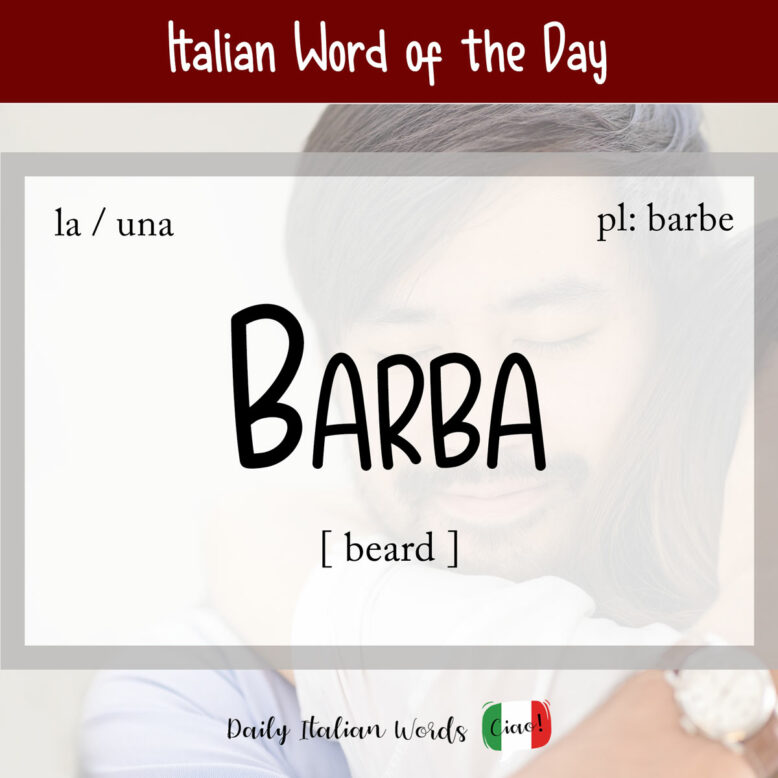Whether you love them or hate them, many men choose to grow a beard at some point in their lives. In Italian, the word for this type of peli del volto (facial hair) is barba.
barba
beard

The word comes from the Latin barba of the same spelling and meaning.
Barba is a feminine noun, so it takes the following definite and indefinite articles:
- la barba = the beard
- una barba = a beard
- le barbe = the beards
- delle barbe = some beards
If you want to say that someone has a beard, you can use either the verb avere (to have) or portare (to wear).
Mario porta la barba da anni.
Mario has had a beard for years.
There are various adjectives you can use to describe a man’s barba. It may be rada (thin), folta (thick / bushy), lunga (long), corta (short), ricciuta (curly) or brizzolata (streaked with grey).
Mio fratello aveva la barba lunga ma se l’è rasata.
My brother had a long beard but he shaved it off.
Now let’s go through the various stages of beard growth!
Immediately after using a rasoio (razor) or rasoio elettrico (shaver) on your face, you should appear ben rasato (clean-shaven). However, you might end up with the occasional taglietto (nick) or pelo incarnito (ingrown hair) if your shave wasn’t perfect.
Then, by around 5 o’clock in the evening, you will start to notice l’ombreggiatura della barba (the shadow of a beard) creeping in. This kind of beard is also known as la barba pomeridiana (the afternoon beard).
If you decide not to raderti (shave yourself) for the next couple of days, you will develop a barba corta (stubble). By this time, your significant other might start complaining if they aren’t used to kissing an itchy face!
If you don’t shave after this stage, we can assume you are actively trying to grow a beard. Those after a more unique look may decide to grow out their basette (sideburns) or keep things neat with a small pizzetto (goatee). The more daring might go for full-blown baffi (moustache) or a barba folta (bushy beard). You might even decide on a barba vichinga (Ducktail or Viking beard)!
But if you’re like many men, you might eventually find that maintaining your beloved barba is too much work. So, you gather your crema / schiuma da barba (shaving cream), a fresh lametta da barba (razor blade), and perhaps a pennello da barba (shaving brush), and after bidding it a bittersweet farewell, you begin to farsi la barba (shave) once again.

Fare la barba is a common expression that means to shave, but it also has the figurative meaning of brushing against or very nearly touching something.
La punizione del giocatore ha fatto la barba al palo.
The player’s free kick brushed against the post.
If you’ve lived in Italy for any amount of time, you are probably aware that barba is also a figurative way of saying noia (bore / drag). It can be used to refer to things, situations or specific people (e.g. Sei proprio una barba = You are a real bore). It appears very frequently in the following exclamation:
Che barba!
What a bore / drag!
Barba has a few other meanings as well. It can refer to the tassel or rootlets of a plant, which gives us the expression mettere le barbe (to take root), in addition to the beard of certain animals, such as the capra (goat).
In some regions, barba is a masculine noun that denotes an elderly man of the household who isn’t the father – il barba – and in colloquial Italian, barbe finte (fake beards) refers to those in the secret service.

Idiomatic expressions featuring ‘barba’
Fare barba e capelli a qualcuno
Literal translation: to do beard and hair to someone
English meaning: to take someone to task, to be extremely critical of someone
Servire qualcuno di barba e capelli
Literal translation: to serve someone from beard and hair
English meaning: to treat someone poorly
Farla in barba a qualcuno
Literal translation: to do it in someone’s beard
English meaning: to trick, to deceive someone
Fare qualcosa alla barba di qualcuno
Literal translation: to do something to the beard of someone
English meaning: to do something at someone’s expense
In barba a qualcosa / qualcuno
Literal translation: in the beard to something / someone
English meaning: in spite of / in defiance of something / someone
Far venire la barba
Literal translation: to make the beard come
English meaning: to be boring
Heather Broster is a graduate with honours in linguistics from the University of Western Ontario. She is an aspiring polyglot, proficient in English and Italian, as well as Japanese, Welsh, and French to varying degrees of fluency. Originally from Toronto, Heather has resided in various countries, notably Italy for a period of six years. Her primary focus lies in the fields of language acquisition, education, and bilingual instruction.


